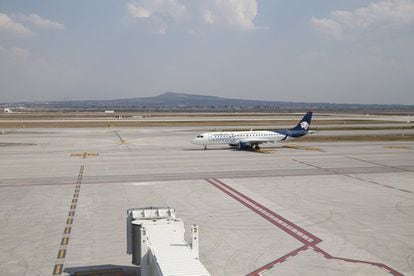An Aeroméxico plane on the runway at Felipe Ángeles International Airport, on March 21. Rodrigo Oropeza
Felipe Ángeles International Airport (AIFA) will soon cease to be an empty shell.
The Mexican Government has reported this Tuesday that more than 100 daily commercial operations will be transferred from the old to the new airport in the capital, which until now only had a dozen trips.
In addition, cargo and charter flights will be transferred immediately.
The announcement is made in response to the serious incident that occurred on Saturday at the Mexico City International Airport (AICM) in which two planes were about to collide.
The agreement reached between the Government and the airlines provides for more than 100 daily operations, between landings and takeoffs, at the AIFA as of August 15, according to a statement published by the Ministry of the Interior.
The airlines that operate in the AICM and that carry tax debts for more than a year will also have to move to another airport.
As for charter and domestic cargo flights, these will be moved immediately to the new terminal.
The Government estimates that in 90 days the necessary infrastructure will be ready to receive, in addition, international cargo flights.
The Government has highlighted that the transfer plan is the product of a "close collaboration" between the authorities and the airlines, and not of an imposition by means of a decree.
More details about the new flight offer will be given in the next few days.
However, Undersecretary Rogelio Jiménez Pons has advanced in an interview with
El Financiero
that the weight of the transfer will be distributed among the three main airlines in the country.
Aeroméxico will take some 30 routes to AIFA;
Volaris, 20;
and VivaAerobús, another 10.
With these measures and the prohibition to open new routes from the AICM, the Executive intends to alleviate the saturation of the country's main airport.
Pressure to resolve this years-old problem has grown since a serious incident between two planes was reported last weekend.
In a video that has gone viral, a device was seen ready to land on a runway that was already occupied by another plane.
The pilot of the first had to take flight again to avoid an accident.
The incident caused alarm among citizens and led to the resignation of the head of the agency in charge of air traffic, Víctor Hernández.
The Government attributed the event to human error by the controller, while the sector's union accused the aviation authorities of exhausting working hours and criticized the shortage of air traffic controllers.
In addition, the union assured that in the last year the incidents have increased by 300%.
The president, Andrés Manuel López Obrador, affirmed on Monday that there was no danger, but called a meeting to "bring order to the chaos."
In addition to reducing operations at the AICM, the government's plan seeks to revitalize, incidentally, the AIFA.
Since it was inaugurated a little over a month and a half ago, the new facilities have operated with just six daily domestic flights and an occasional route to Caracas, the capital of Venezuela, a lack of activity that has upset López Obrador.
The distance from the city center - more than an hour away - and the difficulty of access have discouraged customers and airlines.
Until now, the Government had tried to encourage the transfer to the AIFA through tax reductions.
The Airport Use Fee (TUA), which the airports charge the airlines and they transfer to the price of the ticket, is around 50% cheaper in the AIFA compared to the AICM.
In parallel, López Obrador has entered into conversations with airline executives to expand their offer.
Saturday's incident has accelerated the campaign of conviction.
The Government has taken advantage of the event to tighten the nuts and overcome the reluctance of the companies.
It remains to be seen if passengers will follow this decision despite the longer and more expensive journeys from their homes.
The agreement also addresses another point that has limited the expansion of new routes from the AIFA.
Almost a year ago, Mexico lost category 1 in air safety, granted by the US Federal Aviation Administration. The degradation prevents Mexican airlines from opening flights to the northern country, its main destination abroad.
In the statement, the Government affirms its intention to "redouble efforts" to recover the highest category.
However, analysts doubt that this will happen before the summer.
subscribe here
to the
newsletter
of EL PAÍS México and receive all the informative keys of the current affairs of this country

